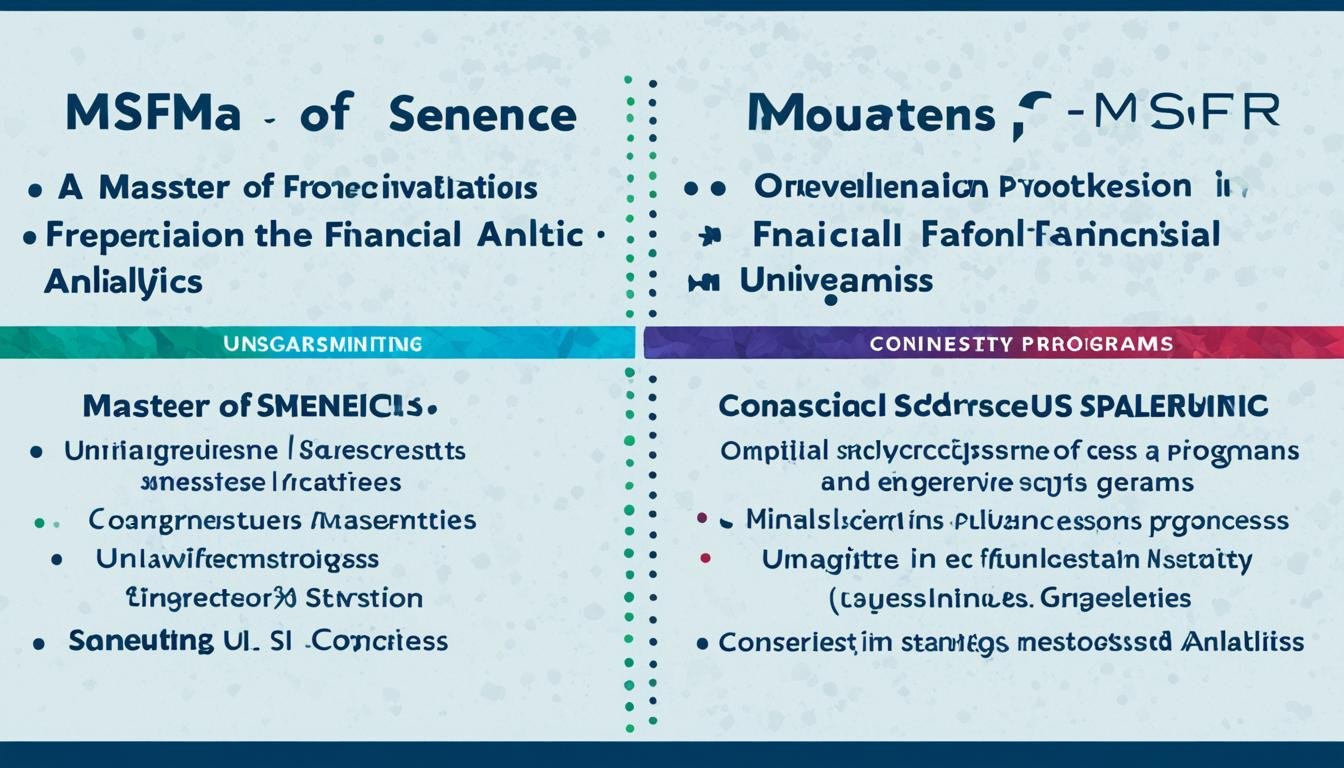Review of Master of Science in Financial Analytics (MSFA) Programs
Did you know that by 2028, the need for financial analytics experts will increase by 23%? Technology is transforming how the finance world operates. More and more, organizations use data to make better choices. Hence, there’s a big demand for people who can understand complex financial data.
Let’s take a detailed look at Master of Science in Financial Analytics (MSFA) programs. We’ll compare the best schools that offer these programs. Then, we’ll look at the courses and how they’re taught and see if it’s a good choice for those wanting to be financial analysts. Finally, we’ll check out the job options an MSFA degree opens up for you.
Key Takeaways:
- Financial analytics professionals are in high demand, with a projected growth rate of 23% by 2028.
- This article reviews Master of Science in Financial Analytics (MSFA) programs, providing a comprehensive analysis of the top schools, curriculum, assessment methods, and suitability for financial analysts.
- An MSFA degree offers valuable career opportunities in the finance industry, equipping individuals with the skills to excel in roles such as financial analyst, investment manager, risk manager, and securities researcher.
- By aligning with the CFA Program learning outcomes, MSFA programs provide a strong foundation for pursuing the CFA charter, further enhancing career prospects.
- Prospective students should consider factors such as program costs, time commitments, and entry requirements when evaluating MSFA programs.
What is CFFP’s Masters in Financial Analysis (MSFA) about?
The MSFA program by CFFP is a deep online degree. It gives advanced skills in financial analysis. Students learn many important topics in financial analytics.
Program Overview
- Economic and financial statement analysis
- Quantitative methods for investment decision-making
- Corporate finance
- Security analysis and valuation
- Alternative investments and risk management
- Portfolio management
- Ethics
The MSFA program matches the CFA Program’s goals. This means students can get ready for the CFA charter if they want.
The course uses hard work, weekly talks with experts, and CFA study materials. Students really understand financial analysis and get skills to help them succeed.
Curriculum Highlights
| Course | Description |
|---|---|
| Economic and Financial Statement Analysis | Learn about the economy and financial statements to see how a company is doing. |
| Quantitative Methods for Investment Decision-Making | Study numbers and math to help with investment choices and risk. |
| Corporate Finance | Look into financial strategies and choices in business. |
| Security Analysis and Valuation | See how to judge different investments to pick the best ones. |
| Alternative Investments and Risk Management | Check out unique ways to invest and how to manage risks. |
| Portfolio Management | Get better at building and handling investment groups. |
| Ethics | Learn about being ethical and responsible in finance. |
These courses work together to give a full look at financial analysis. Graduates are ready for many finance jobs.
If you’re in finance and want to get better, or just out of school and into financial analysis, the MSFA course has what you need. It gets you ready for the busy world of financial analytics.
Who is MSFA suited for?
The Master of Science in Financial Analytics (MSFA) program welcomes many. It’s perfect for those eyeing a finance career. Also, it’s great for finance pros wanting to boost their skills in analysis.
It fits into the lives of working folks very well. They can learn at a time that suits them, even as they work. Such an approach mixes job experience with new learning smoothly.
Professionals with finance titles like CFP, CPA, and CFA get some perks. They may skip some courses, making studying quicker and easier. For them, the MSFA is a smart move to sharpen skills and stand out.
This program can lead to exciting finance jobs. Think about roles in investment banking, risk analysis, and more. After the MSFA, students are ready for the finance world’s tough challenges.
Plus, the MSFA really boosts chances of moving up the career ladder quickly. Thanks to this degree, finance leaders might offer better roles and pay.
The MSFA guides finance pros through today’s finance demands. It helps master complex markets and wise investments.
Target Audience for MSFA
The MSFA suits a variety of ambitions:
- Have a minimum of a Bachelor’s degree
- Aspire to pursue a career as a financial analyst
- Are working professionals seeking to enhance their knowledge and skills in financial analysis
- Hold professional designations such as CFP, CPA, CAIA, CFA, FRM, CMA, or CPWA
- Desire to excel in roles related to investment banking, portfolio management, risk management, or securities research
Diverse scholars keen on finance find a place in the MSFA. The program ensures they get a deep financial analytics education. It prepares them for success in finance roles.
MSFA exam format: Exams? We don’t need no stinkin’ exams…
The MSFA program does things differently to gauge student know-how in financial analysis. It doesn’t just rely on exams like most programs. Instead, it uses many ways to check if students master the material.
During their time in the program, students tackle readings, join group talks, solve case studies, and take tests. Each assignment and test is based on what they’re supposed to learn. This makes sure they’re progressing as they should.
“The assessment methods used in the MSFA program are designed to challenge students. They aim to build a thorough understanding of financial analysis. It’s more than memorizing; it’s about using what you know in the real world.”
Getting the MSFA degree means finishing all 10 courses with at least a C grade. Students also have to keep a 3.0 GPA. This shows they’ve consistently done well and are ready for financial analytics careers.
The program’s assessments give a complete view of how students are doing and if they’re ready for finance jobs. By combining different types of assignments and tests, it helps students learn to handle complex financial info effectively.
Assessment Methods in the MSFA Program
The MSFA program checks how well students grasp financial analytics in many ways. These include:
- Reading Assignments: They read about key theories, concepts, and real-life financial cases. This builds their knowledge base.
- Group Discussions: Talking with others helps students share ideas and how they apply finance concepts. It boosts their critical and communication skills.
- Case Studies: Solving real financial problems sharpens students’ skills in applying what they’ve learned. It’s hands-on learning.
- Exams: Regular tests make sure students understand the materials. They are challenged to show their financial analysis skills accurately.
Through a mix of these assessments, students get a full evaluation of their financial analytics expertise.
The MSFA program does its best to ready students for finance jobs. With tough assessments and a full curriculum, graduates leave with the tools and confidence they need in the finance world.
MS Financial Analysis topic areas and credits
The Master of Science in Financial Analytics (MSFA) program dives into key areas for top-notch financial analysts. Each class gives three credits, and you need 30 credits to graduate. Here’s a peek at what the MSFA program covers:
- Financial Statement Analysis: This class hones in on deciphering financial statements. It helps you understand how healthy and well companies are performing.
- Advanced Financial Statement Analysis: Going further from the basic analysis, this course introduces advanced strategies and concepts.
- Economics for Financial Analysis: Here, students get to grips with economic situations. They learn how these scenarios affect financial decisions and analysis.
- The Financial System, Markets, and Instruments: This course sheds light on the financial system, markets, and the different financial tools available.
- Quantitative Methods: You’ll learn all about number-based methods essential in financial analysis. This includes statistical tools and ways to predict future trends.
- Security Analysis and Valuation: In this class, the focus is on examining securities. It shows you how to value assets through detailed analysis.
- Corporate Finance: Students get a deep understanding of corporate finance. This involves making big money decisions for companies and finding ways to fund them.
- Derivatives and Alternative Investments: This topic looks into alternative ways to invest, like options, futures, and hedge funds.
- Portfolio Management: Here, you’ll pick up on managing investment portfolios. The course teaches strategies to make your investment pile grow.
- Financial Analysis Capstone: The last course brings everything together. It lets you put your financial analysis skills to work on real situations.
The MSFA program sets a strong base in finance analysis. It primes you for a successful path in the finance sector.
MSFA fees: adding up the full bill
The Master of Science in Financial Analytics (MSFA) program is a great way to boost your education and career. But, it’s smart to think about the costs too. Tuition fees can change based on where you live, and if you get any help like scholarships. It’s key for people thinking about the program to check if they can manage the costs.
The MSFA program is all online. This means you don’t have to worry about paying for a place to live or getting to class. Students can just concentrate on paying for courses and study materials.
Planning your finances is very important if you’re interested in the MSFA program. Knowing the tuition costs and what you have in your wallet is a good start. It helps make sure you don’t run into money troubles. Also, look into scholarships and other ways to get help paying for the program.
Finding out about the costs and how to manage them can help you make the most of the MSFA program. It can really improve your education, skills, and chances in the world of financial analytics.
| Tuition Fees (vary based on factors such as residency status) |
|---|
| Tuition fees for the MSFA program |
| Expenses for study materials and resources |
| Potential additional costs (e.g., technology requirements, software subscriptions) |
Exam schedule & key deadlines
The Master of Science in Financial Analytics (MSFA) program lets students finish in under two years, part-time. The time it takes can be different, depending on how fast you go and if you skip some courses with a professional title. Knowing important dates for each course is key to finishing on time.
In the MSFA program, you’ll need to keep up with assignment and exam dates. This is very important for staying on schedule. It helps you move forward smoothly and get the most from your studies.
This program is set up for you to juggle work and studying well. This is great news for those working and learning at the same time. It makes it easier to increase your financial analytics skills while you work.
Being organized and planning ahead is a big part of doing well in this program. It’s all about managing your time and resources wisely. This way, you can handle your courses, tasks, and tests without stress.
The MSFA program gives you a strong financial analytics education. And you can balance it well with your job and personal life. It’s a great way to aim for your career dreams in financial analysis.
What are the entry requirements for MSFA?
If you want to join the MSFA program, start by earning a Bachelor’s degree. This degree must come from a known school. You also need to pass a college calculus and statistics course. Having a job is good, but not a must. It could make your application look better though.
If you’re applying from another country, you must show even more documents. This includes having your school records checked by a specific group. You also need to prove you speak English well with a test result. The MSFA program is open to people from many educational paths who love finance.
| Entry Requirements for MSFA | Eligibility Criteria |
|---|---|
| Bachelor’s Degree | Minimum of a Bachelor’s degree from an accredited institution |
| Prerequisite Courses | – One course of college-level calculus – One course of college-level statistics |
| Work Experience | Not required, but can strengthen the application |
| International Applicants | – Additional documentation such as evaluated academic records and transcripts – Proof of English proficiency through a standardized test |
| Diverse Academic Backgrounds | Welcome applicants from diverse academic backgrounds with a strong interest in financial analysis |
Benefits of MSFA: what’s in it for you
The MSFA program has many benefits for those aiming for a financial analysis career. Graduates become skilled in financial analysis. This sets them apart in the job world.
One key advantage is better job prospects with an MSFA degree. They can work as financial analysts, investment managers, and more. The program helps them make smart choices and share useful insights with companies.
Additionally, the MSFA degree leads to more career opportunities and growth. It shows a dedication to learning and growing in financial analysis. This can bring more jobs, higher pay, and a steadier career path.
Being tied to the CFA Program means graduates are well-rounded in finance. They are ready to pursue the CFA charter too. This makes the MSFA degree more valuable and broadens job chances in finance.
Students also get access to Kaplan Schweser’s CFA study materials. This tool helps them study better for the CFA exams. It’s a great way to boost their chances of doing well.
In summary, the MSFA program gives a deep and complete study in financial analytics. It lays a strong base for a rewarding career in finance.
CFA vs MS in Financial Analysis: An In-Depth Comparison
The CFA Program and the MSFA program are both great for learning about financial analysis. They’re different, though. The CFA program leads to a professional designation after passing tough exams. On the other hand, the MSFA program is a master’s degree that gives you a big-picture education in financial analytics.
The CFA program will teach you a lot about investment analysis and how to manage portfolios. You’ll learn about investment tools, how to value assets, manage portfolios, and about ethics. This program is known worldwide and is well-respected. It’s for people who want to dive deep into investing and understand the financial markets better.
Alternatively, the MSFA program broadens your horizons in financial analysis, covering more topics. You’ll learn about financial statements, how to analyze data, managing risks, finances of companies, and different types of investments. This program prepares you with a wide range of skills to handle financial data and make smart choices in various financial jobs.
While the CFA program is specifically for investment expertise, the MSFA program offers a skillset that’s more versatile across different financial fields.
One big difference between the programs is how they test you. The CFA program has three tough levels of exams, with different question types. The MSFA program, however, tests you throughout with various assignments, like case studies and group projects.
Summing up, the CFA program makes you a pro in investment management. But the MSFA program gives you a wider view of financial analysis. Your choice depends on what kind of financial career you dream of. Some want the CFA for a strong start in investments. Others choose the MSFA for its broad knowledge and skills.
Pros and Cons of CFA and MSFA Programs
Here’s a comparison of the CFA and MSFA programs:
| Program | Pros | Cons |
|---|---|---|
| CFA |
|
|
| MSFA |
|
|
Ultimately, the decision between CFA and MSFA depends on what you want in your finance career and your own situation. Both are good choices for boosting your finance career opportunities.
Conclusion
The Master of Science in Financial Analytics (MSFA) program from the College for Financial Planning (CFFP) is top-notch. It gives a deep dive into financial analysis. Its online nature makes it open to many, and it lines up with CFA Program criteria. This makes it perfect for those wanting to work in financial analysis.
Students cover a lot, like how to analyze economies and financial statements. They learn about making investment choices and understanding corporate finance. They also look into valuing securities, managing risks in ways that aren’t just stocks or bonds, and the importance of ethics. Such topics are key for a future in finance.
The program also comes with Kaplan Schweser’s material for the CFA exam. This bonus really boosts the program’s value. It puts students in a great spot for passing the CFA exam and growing their financial analysis skills. This is how the MSFA program does more for professionals.
Overall, the MSFA program is a prime pick for gaining high-level financial analysis skills. Its online setup and CFA alignment make it a full package. It’s a great choice for anyone looking to up their game in financial analytics and climb the finance career ladder.
FAQ
What is the MSFA program offered by CFFP?
The MSFA program is a chance to learn advanced financial skills. It is all online, making it easy to study from anywhere.
Who is the MSFA program suited for?
It’s perfect for those who want to work as financial analysts or need more skills in finance. This includes people working in finance who want to grow in their field.
What is the assessment method in the MSFA program?
You’ll be tested through reading, talking in groups, solving cases, and taking exams. This mix of methods helps make sure you’re learning well.
What topics are covered in the MSFA program?
You’ll study things like understanding financial statements, using math in finance, and managing company money. There’s a lot more to learn too.
What are the fees for the MSFA program?
The costs of the program depend on where you live and if you get financial help. Tuition is the main fee you’ll pay.
What is the timeline for completing the MSFA program?
You can finish the program in less than two years if you study part-time. The exact time it takes can change for everyone.
What are the entry requirements for the MSFA program?
To get in, you need a Bachelor’s degree. You also must know some math like calculus and statistics from college.
What are the benefits of the MSFA program?
You’ll gain high-level skills in finance, making your job options better. It also helps you grow and move up in your career.
How does the MSFA program compare to the CFA Program?
The MSFA is a detailed academic program. It teaches much about finance. The CFA is more focused on exams for a professional title in finance.








